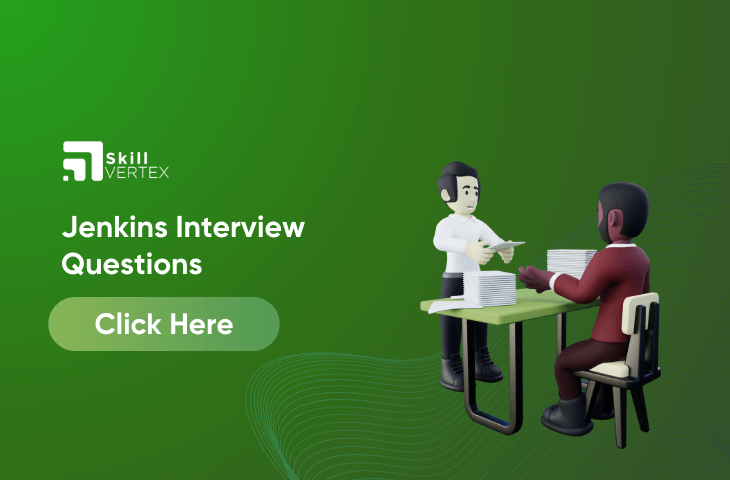1. What is the difference between Jenkins and Bamboo?
2. What is Jenkins?
3. Define the process of Jenkins.
4. What are the benefits of using Jenkins?
5. What are the pre-requisites for using Jenkins?
6. What is the relation between Hudson and Jenkins?
7. Mention some of the useful plugins in Jenkins
8. How do you install Jenkins?
9. What are the two components that you can integrate Jenkins with?
10. What is Maven? What is the benefit of integrating Maven with Jenkins?
11. Mention what are the commands you can use to start Jenkins manually.
12. Which SCM tools Jenkins supports?
13. How will you define Post in Jenkins?
14. What are Parameters in Jenkins?
15. What is Groovy?
16. Which commands can be used to begin Jenkins?
17. What are the common use cases Jenkins is used for?
18. What is a Jenkins job?
19. How do you store credentials in Jenkins securely?
20. How Can You Clone A Git Repository Via Jenkins?
21.Explain how you can set up Jenkins job.
22. How to create a backup and copy files in Jenkins?
23. How will you secure Jenkins?
24. Explain how you can deploy a custom build of a core plugin?
25. What you do when you see a broken build for your project in Jenkins?
26. What are the various ways in which build can be scheduled in Jenkins?
27. What is the use of Pipelines in Jenkins?
28. Explain the terms Agent, post-section, Jenkinsfile
29.Do you know about cloud computing? How can Jenkins fit into a cloud computing environment? Explain with an example.
30. What is Kubernetes? How can you integrate Jenkins with Kubernetes?
31. Have you run automated tests on Jenkins? How is it done?
32. Let us say, you have a pipeline. The first job was successful, but the second failed. What should you do next?
33. What is the use of JENKINS HOME directory?
34.What is a backup plugin? Why is it used?
35. What is a trigger? Give an example of how the repository is polled when a new commit is detected.
36. How do you define parameters for a build in Jenkins?
37.What are the ways to configure Jenkins node agent to communicate with Jenkins master?
38. How does Jenkins authenticate users?
39. How can you use a third-party tool in Jenkins?
40.What are the types of pipelines in Jenkins?
41.What syntax does Jenkins use to schedule build job or SVN polling?
42. What is DevOps and in which stage does Jenkins fit in?
43.Do you know any other Continuous Integration tools? How is Jenkins better than any of those?
44.Name a Jenkins environment variable you have used in a shell script or batch file.
45. What is Continuous Integration In Jenkins?
46. How do you achieve continuous integration using Jenkins?
47. What is blue ocean in Jenkins?
48. What is Jenkins Build Cause?
49. How did Jenkins know when to execute a Scheduled job/pipeline and how it is triggered?
50. What are the Scopes of Jenkins Credentials?
51. What is a Jenkins Shared Library and how it is useful?
Jenkins Interview Questions And Answers
- Difference Between Jenkins and Bamboo:
Ans.
- Jenkins:
- Open-source automation server.
- Extensive plugin ecosystem.
- Highly customizable and adaptable.
- Community-driven development.
- Bamboo:
- Commercial product by Atlassian.
- Integrated with other Atlassian tools.
- Simplified interface and configuration.
- Paid licensing.
2.What is Jenkins
Ans.
- Jenkins is an open-source automation server used for building, testing, and deploying software. It facilitates continuous integration and continuous delivery (CI/CD) by automating the software development process.
3.Define the Process of Jenkins:
Ans.
- Jenkins follows a process of continuous integration and continuous delivery:
- Developers commit code changes.
- Jenkins detects changes and triggers a build.
- Automated tests are executed.
- If tests pass, the software is deployed to a staging environment.
- Additional tests and validations are performed.
- If successful, the software is deployed to production.
4.Benefits of Using Jenkins:
Ans.
- Automation of repetitive tasks.
- Continuous integration and delivery.
- Quick identification and resolution of bugs.
- Extensive plugin support for integration with various tools.
- Scalability and flexibility.
5.Pre-requisites for Using Jenkins:
Ans.
- Java Development Kit (JDK) installed.
- A web browser for accessing the Jenkins dashboard.
- Jenkins server configured and running.
6.Relation Between Hudson and Jenkins:
Ans.
- Jenkins originated as a fork of the Hudson project. Due to differences in community and governance, Jenkins was created to continue open-source development independently.
7.Useful Plugins in Jenkins:
Ans.
- Git Plugin: Integrates with Git version control.
- JUnit Plugin: Publishes JUnit test results.
- Docker Plugin: Enables integration with Docker containers.
- Pipeline Plugin: Supports defining continuous delivery pipelines.
- Slack Notification Plugin: Sends notifications to Slack channels.
8.How Do You Install Jenkins:
Ans.
- Download Jenkins WAR file from the official website.
- Run Jenkins using the command:
java -jar jenkins.war - Access Jenkins on a web browser at
http://localhost:8080
9.Two Components to Integrate Jenkins With:
Ans.
- Version Control System (VCS): Like Git or SVN for source code management.
- Build Tools: Such as Maven or Gradle for building and packaging applications.
10What is Maven? Benefit of Integrating Maven with Jenkins:
Ans.
- Maven is a build automation tool used for managing projects.
- Integrating Maven with Jenkins ensures consistent and repeatable builds. It simplifies the build process and manages project dependencies.
- Git, SVN, Mercurial, CVS, and more.
Hello, I’m Hridhya Manoj. I’m passionate about technology and its ever-evolving landscape. With a deep love for writing and a curious mind, I enjoy translating complex concepts into understandable, engaging content. Let’s explore the world of tech together

